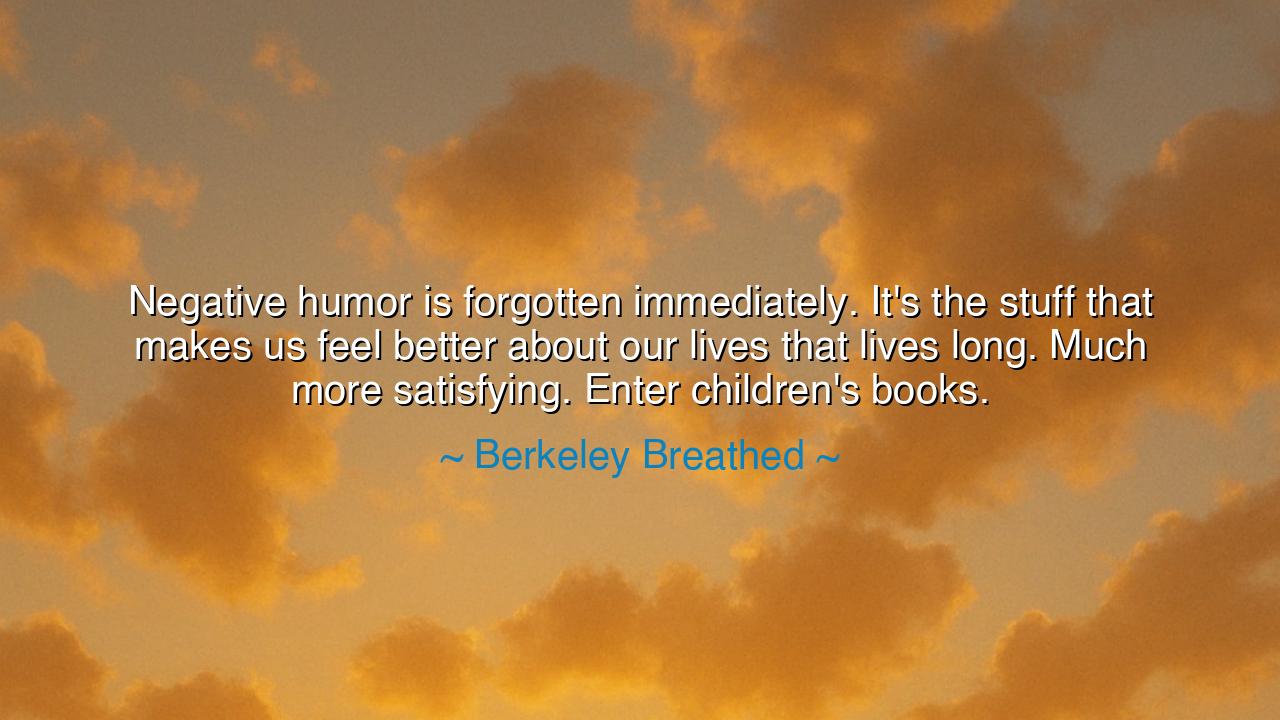
Negative humor is forgotten immediately. It's the stuff that
Negative humor is forgotten immediately. It's the stuff that makes us feel better about our lives that lives long. Much more satisfying. Enter children's books.






The artist and storyteller Berkeley Breathed, creator of whimsical worlds and heartfelt laughter, once said: “Negative humor is forgotten immediately. It's the stuff that makes us feel better about our lives that lives long. Much more satisfying. Enter children's books.” In these few lines lies a truth older than writing itself — a truth about the spirit of laughter, the memory of joy, and the healing power of kindness. Breathed, who gave us the gentle satire of Bloom County and the warmth of Opus the Penguin, understood that while sharp wit may wound or startle, it is hopeful humor — laughter born from love — that endures through generations. He speaks here not as a cynic, but as a sage who has seen that the most profound humor is not that which mocks life, but that which celebrates it.
To say that “negative humor is forgotten immediately” is to reveal the fleeting nature of cruelty. Mockery, ridicule, and scorn may win brief applause, but they vanish like smoke, leaving only bitterness behind. Such laughter, when directed downward, separates instead of uniting; it feeds the ego but starves the heart. Breathed contrasts this with the eternal humor of compassion — the kind that uplifts rather than belittles, that allows us to laugh at ourselves and still feel whole. This laughter does not age, for it speaks to what is timeless in us. It reminds us that even amid confusion and imperfection, life is still good. The humor that heals, as Breathed says, “makes us feel better about our lives” — not by denying hardship, but by shining light upon it with tenderness.
The ancients themselves understood this sacred difference between cruel wit and joyful mirth. The philosopher Aristotle, in his lost treatise on comedy, wrote that laughter is born when we recognize our own folly safely — when we see our weakness reflected in others without hatred. In the festivals of Dionysus, Greek citizens laughed not to mock, but to renew the soul. Laughter was medicine. The dramatists who filled the Athenian theaters knew that the greatest gift humor can offer is release — the sigh of recognition that says, I am not alone. This is the laughter of which Breathed speaks: laughter that binds the human spirit, laughter that leaves behind peace, not pain.
When Breathed declares, “Enter children’s books,” he reveals where this purest laughter lives. For in the world of children, humor has not yet been weaponized by cynicism. It is the laughter of discovery, of wonder, of gentle absurdity. In the pages of A.A. Milne, Dr. Seuss, and E.B. White, we find humor that lifts rather than pierces — that transforms sorrow into imagination and confusion into compassion. A child’s laughter is holy; it is untainted by cruelty or pride. And those who write for children — as Breathed himself did with Mars Needs Moms and The Last Basselope — strive to protect that sacred innocence. They understand that the truest humor does not teach superiority; it teaches empathy.
Consider, for example, the tale of Charles Schulz, the creator of Peanuts. His humor was not loud or cruel, but gentle and true. Charlie Brown’s endless defeats, Snoopy’s daydreams, and Lucy’s bossy wisdom all reflected the quiet struggles of every soul. Yet no one left Schulz’s world bitter or ashamed. His comic strips, like Breathed’s, gave comfort through recognition. They whispered: Life is hard, but still, we can smile. Such humor endures not because it dazzles, but because it heals. The laughter of kindness takes root in the heart and outlives its maker.
The lesson that flows from Breathed’s wisdom is clear and eternal: choose humor that builds, not humor that breaks. In every conversation, every creation, every jest, ask — does this laughter bring warmth or wound? Does it mock or mend? True humor, the kind that “lives long,” requires courage — for it is easier to sneer than to uplift. Yet the laughter of kindness strengthens both the speaker and the listener. It restores faith in our shared humanity.
And so, remember this teaching: Laughter is not just noise — it is legacy. The humor that endures is not the one that conquers, but the one that comforts. Let your words be gentle enough to heal, yet brave enough to reveal truth without cruelty. When you speak or create, aim not to make others feel small, but to make them feel seen. As Berkeley Breathed reminds us, the humor that lasts forever is the one that helps us bear life with grace — and if you wish to touch eternity, let your laughter be kind.






AAdministratorAdministrator
Welcome, honored guests. Please leave a comment, we will respond soon